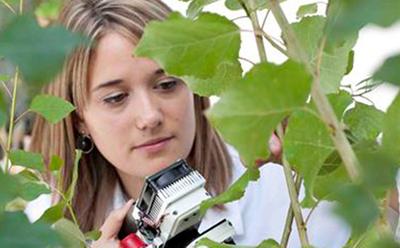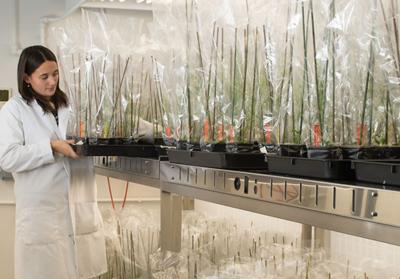Biochar to boost plant growth – too good to be true?

A research article published by Dr Maud Viger and colleagues from Professor Gail Taylor’s laboratory at the Centre for Biological Sciences advises caution on the use of biochar to tackle the effects of climate change. Biochar, a type of highly porous charcoal formed of agricultural waste, can be added to soils to help them retain nutrients and water; its supporters believe it can increase food security and cropland diversity in areas with poor soils.
Maud’s article reports the first ever examination of global gene expression for plants grown in biochar – meaning that the expression of more than 20,000 genes that control plant growth and defence was quantified. The article was one of the top 15 most downloaded papers of 2014 published by Global Change Biology Bioenergy (GCB-B) and was also widely reported on by social media and recently featured in a Nature News and Comment report.

Her research involved the cultivation of lettuce and thale cress in biochar-treated soil. The plants grew up to twice as fast and global gene expression data attributed this to growth hormones auxin and brassinosteroids. However, defence genes such as those relating to jasmonic acid and ethylene were suppressed. This means, although plants may grow faster and yield better in biochar treated soils, their ability to resist pest and pathogen attack may be compromised. The results highlight the complexity of the interaction between plant, soil and biochar and questions the validity of biochar as a soil treatment and method to sequester carbon.
This research was carried out as part of the EUROCHAR (a European FP7 project) and the Carbo-BioCrop project. These projects total more than £3m in research funding and the latter is a £1.2m consortium project on land-based renewable energy sources, co-ordinated by Professor Gail Taylor. It is funded by the Research Councils’ UK Energy Programme linked to the Living With Environmental Change (LWEC) programme.
.jpg_SIA_JPG_fit_to_width_INLINE.jpg)
Her research involved the cultivation of lettuce and thale cress in biochar-treated soil. The plants grew up to twice as fast and global gene expression data attributed this to growth hormones auxin and brassinosteroids. However, defence genes such as those relating to jasmonic acid and ethylene were suppressed. This means, although plants may grow faster and yield better in biochar treated soils, their ability to resist pest and pathogen attack may be compromised. The results highlight the complexity of the interaction between plant, soil and biochar and questions the validity of biochar as a soil treatment and method to sequester carbon.
This research was carried out as part of the EUROCHAR (a European FP7 project) and the Carbo-BioCrop project. These projects total more than £3m in research funding and the latter is a £1.2m consortium project on land-based renewable energy sources, co-ordinated by Professor Gail Taylor. It is funded by the Research Councils’ UK Energy Programme linked to the Living With Environmental Change (LWEC) programme.